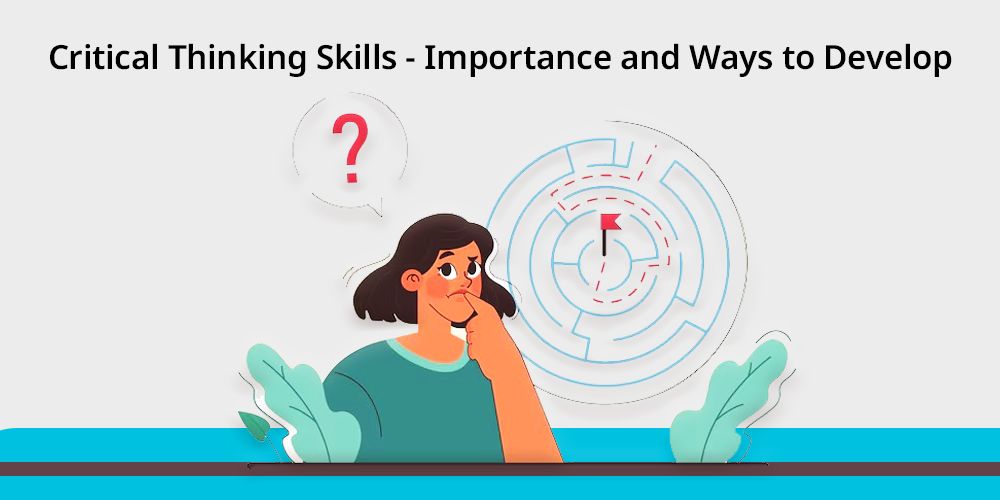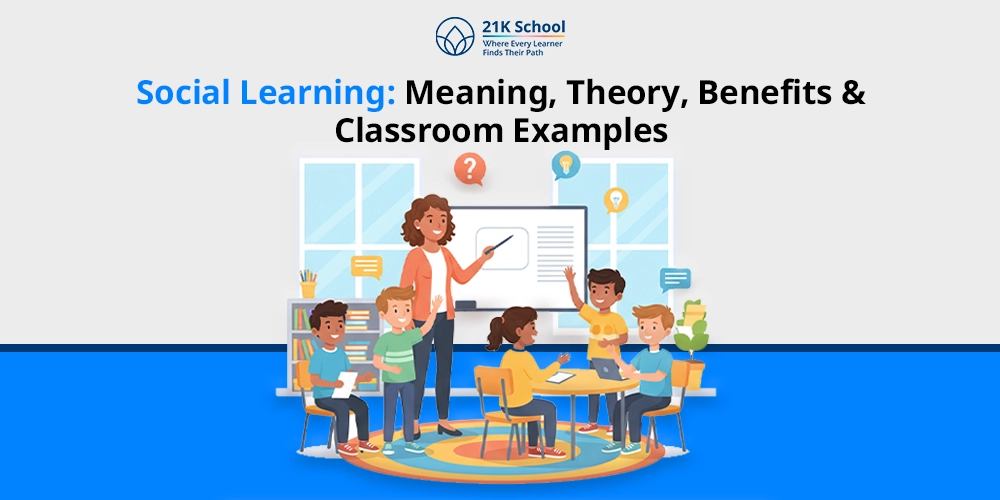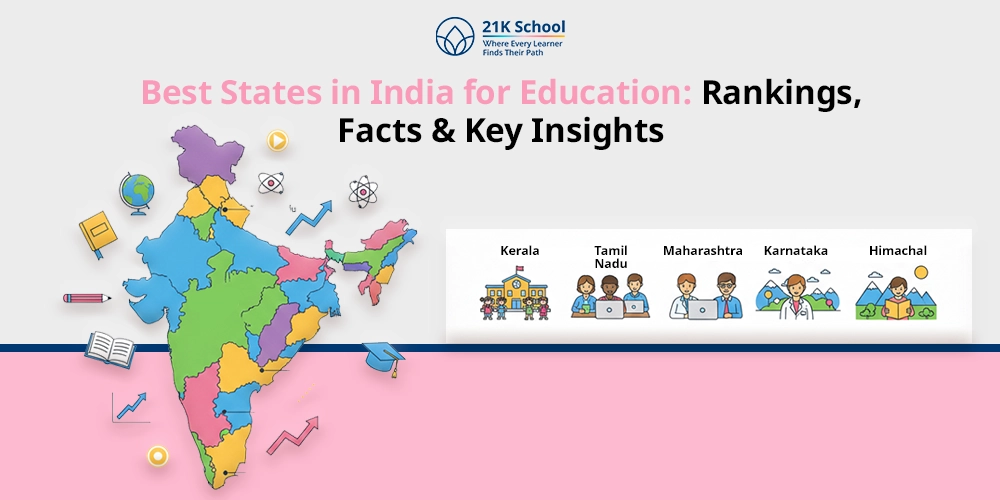
Critical thinking is an important aspect of growth and success, which demands different skills for students’ success. It requires analysis, evaluation, and unbiased judgment.
Critical thinking demands reasoned judgement, with the importance of communication skills and interacting effectively. It challenges you and asks you to adapt to every new situation and problem.
Critical thinking skills allow you to comprehend different problems with facts and information, and then draw a conclusion.
Go through the complete blog below to know more about the critical thinking skills required for students. Meanwhile, you can also learn about critical thinking activities for kids for their overall development.
With this, the blog also explains to you how you can develop such critical thinking skills in students.
Contents
- What are critical thinking skills?
- Critical thinking skills examples
- Key aspects of critical thinking
- Importance of critical thinking
- How to promote critical thinking skills in the classroom?
- What is the primary purpose of developing critical thinking skills?
- How to Develop Critical Thinking Skills in Students?
- Critical Thinking Skills vs Analytical Skills
- Key Takeaways
What are critical thinking skills?
Critical thinking skills are the skills used to analyse and evaluate information and arguments. It is based on evidence or past experiences. Other than this, it identifies and solves problems in order to come to a conclusion.
Critical thinking skills allow you to think rationally, logically, which is unbiased and open- minded. It eases the process of problem- solving in a systematic way, with logical solutions. With the help of critical thinking skills, you can break your task into smaller parts or divisions, and solve it effectively.
Critical thinking skills examples
Here are some examples of critical thinking skills based on real- life events. You can go through it and easily relate to it.
1. Analytical thinking
A student from science stream went through the experiment in this laboratory. Here with the use of critical thinking skills, he was able to identify the hypothesis, prepare methods and drive conclusions.
2. Evaluation
A monitor in class had to come up with a conclusion, for one situation occurred in his class. There he evaluated both situations and came to a conclusion.
3. Interpretation
You have been assigned a group project where you have to demonstrate your assignment. Here interpretation is required, wherein you are asked to interact with your peer groups and explain your project. Critical thinking skills help in interpreting and communicating effectively.
4. Problem- solving
In day- to- day life, you face challenges in different situations. Here with the help of critical thinking skills, you can solve your problems and ease them.
Key aspects of critical thinking
Critical Thinking Skills are the fundamental key that enables students to identify, analyse, evaluate, and make decisions. While decision- making, the decision has to be rational and based on facts and information.
Here you can go through some of the key aspects of critical thinking that are necessary for students.
1. Communication
Communication process involves sharing and interpreting information, either verbally or nonverbally. It includes clear expression of thoughts, active listening and understanding each other.
Effective communication plays a crucial role as it develops and showcases critical thinking skills during this process.
2. Problem-solving
Problem-solving skills involve determining and analyzing problems and finding solutions to eradicate such issues.
Critical thinking is a crucial part of problem- solving activity. It includes identifying and analysing the situation, and developing rational solutions. It teaches skills to remove obstacles and combat challenges.
3. Interpretation
Interpretation involves analyzing and comprehending information and sharing it with others.
Interpretation skills play a pivotal role in the critical thinking process. Interpretation process involves synthesizing, analysing and then coming to a well-rounded decision.
4. Evaluation
Evaluation involves evaluating any situation or circumstances with analytical judgment.
Evaluation processes are based on evidence and rational thoughts. It assesses arguments, claims, issues and then concludes.
5. Synchronizing
Synchronising involves the interpretation of information or discussions in a synchronizing order.
Synchronising process involves understanding each other, coordinating and putting efforts in order to meet the common goal. Synchronising is crucial in decision making, problem- solving and critical thinking activities.
6. Self-analysis
Self-analysis involves self-analysis of the ability to comprehend and the thought process, so that we may think rationally.
It recognizes biasedness, different perspectives and understanding emotions and feelings. Critical thinking skills pinpoint areas of improvement and follow analysis based on past experiences.
Importance of critical thinking
Critical thinking is the key component in students’ success, especially in today’s times. In all discussions, speech, and group activities, it is required. It fosters identification of problems, analysis, and evaluation.
It is required in all parts of development and sectors. These days, the importance of skill development in school education is rising.
Here are some valuable skills for critical thinking that can take you a long way.
1. Problem- solving
Problem- solving skills involve identification, analysing and evaluation of issues and solving problems.
Problem-solving skills act as a key factor in the critical thinking process.
2. Personal and professional growth
Growth, in both personal and professional sectors, is enhanced with the help of critical thinking skills. It is beneficial for both students and professionals.
Know more about online courses for professional development for students.
In terms of solving problems, decision making or interacting with others, such skills serve as core elements.
3. Decision making
Decision-making process requires identification of the problems, gathering facts and information, analysing and evaluating them.
The conclusion derived should be based on a systematic order and logical reasoning.
4. Communication
Critical thinking skills support the communication process. With critical thinking skills, students can think rationally, and then make a decision.
It aids communication skills, discussions and any judgment. Now, we are going to discuss how you can develop such skills in detail.
Go through these steps, and you will be able to analyze how critical thinking skills can be improved.
How to promote critical thinking skills in the classroom?
To promote critical thinking skills in the classroom, educators need to create an environment that encourages curiosity.
Students should feel free and be able to think critically. Here are certain ways to promote critical thinking skills that educators can strategize in the classroom.
1. Ask questions
Asking questions demands students to be curious. When they ask questions, their mind will run to know the correct answer.
Asking questions is the critical part of this process since it clarifies and stimulates the process of critical thinking skills.
2. Group discussion and debates
Group discussion and debates put students in circumstances where they are in the middle of so many viewpoints.
There students argue and try to put their points forward with supporting answers. During these group discussions, here are some tips for online group projects
3. Problem- solving skills
Problem- solving skills enable students to solve their problems on their own. It triggers them to come out with solutions on their own.
Problem solving builds students not only in their careers but also in their personal path. It synthesizes, analyses and evaluates the problems and issues based on rational solutions.
4. Analysis and evaluation skills
Analysis and evaluation skills among students make them go through different arguments, evidence and come to a conclusion.
Analysis and evaluation skills dissect the issues into parts and evaluate them based on the evidence and facts.
What is the primary purpose of developing critical thinking skills?
The primary purpose of developing critical thinking skills is letting students think rationally, based on evidence, information and past experiences. Such skills helps students in following ways:
1. To think logically
Critical thinking skills lets students think and understand logically. It allows them to analyse situations without bias and prior judgements.
2. Problem- solving
Problem- solving involves approaching problems in a practical way. Break your problems into different parts, and deal with them methodically.
3. Effective communication
Effective communication helps in clear expression of ideas and thoughts and present arguments with proper evidence and misinformation.
4. Evaluate arguments
To evaluate arguments, critical thinking skills demand to judge the credibility of information. The facts and evidence should be from reliable sources and free from personal opinions.
5. Make decisions
Decisions shall be made based on evidence and considering multiple perspectives. Before deriving conclusions, critical thinking skills help to analyse the situation and then announce consequences.
6. Avoid misinformation
Avoiding misinformation and manipulation restricks fake and fraudulent information. Critical thinking skills avoid misleading propaganda, arguments or people’s pressure.
How to Develop Critical Thinking Skills in Students?
To develop critical thinking skills, here are some ways that educators can use students in the classroom.
1. Improve your communication skills
To improve your communication skills, students are required to identify any issue, analyse and evaluate things.
Critical thinking skills develop communication skills and prepare students for success.
2. Be curious about things
When you are curious about things and ask questions, you require critical thinking skills. Critical thinking skills develop your analysing and evaluation power with decision-making ability.
These steps enhance understanding and challenge you for development.
3. Open- mindedness
Open- mindedness helps in staying unbiased while making any decision. Students can be open- minded and rational in considering judgments.
Critical thinking skills allow them to consider new thoughts, perspectives and arguments with no prejudice.
4. Reflective thinking
Reflective thinking allows students to analyse one’s thoughts, actions and work upon it. Such a process helps in future building for better outcomes and deeper understanding.
Critical thinking skills require reflective thinking, analysis, and deeper understanding for better results.
5. Interpretation
Interpretation includes the process of interpreting information and data to conclude. Critical thinking skills solve complex issues with the interpretation of given data and then conclude.
6. Be problem-solving
Critical thinking skills involve determining your problems and being solution- oriented based on the evidence and facts. It relies on rational reasoning to make wise decisions.
The problem-solving techniques enhance your skills to identify the issues and solve your problems.
7. Supporting Diverse perspectives
Diverse perspectives offer a wide range of experiences, approaches and perspectives to solve problems and issues. By getting engaged with diverse perspectives, students have the option of varied viewpoints.
Diverse perspectives enhance problem- solving, analytical skills, and critical thinking abilities of learners.
Critical thinking skills promote discussions on relevant issues with analysis and critical thinking. Students who get engaged in discussions are likely to solve problems and interact easily with their peer groups.
Comprehending assumptions and evidence well, examines their critical thinking skills. It also requires communication skills and the ability to think rationally.
9. Research
Research process gathers information from multiple sources, evaluates and analyzes using critical thinking skills.
With the help of critical thinking skills, it synthesizes data and fills gaps required in information.
10. Seek feedback
Seeking feedback on your viewpoints, analysis, and evaluation allows you to improve your critical thinking skills.
It gives you the chance to improve your critical thinking ability.
Critical Thinking Skills vs Analytical Skills
| Basis of distinction | Critical thinking skills | Analytical skills |
| Definition | An ability to think clearly, analyse and evaluate with reasoned judgements. | An ability to break down tasks into smaller units, for problem- solving. |
| Focus | Analysing, evaluation, decision- making. | Data interpretation and organisation. |
| Purpose | To assess circumstances logically with well- informed judgments. | To solve problems, interpret data and trends. |
| Skills | Evaluation, problem- solving, analysing and decision- making. | Data analysis, pattern and detail recognition and organisation. |
Key Takeaways
Critical thinking skills are a crucial part of growth and development. It aids you in processing communication skills.
With this, it helps you in discussion upon different viewpoints, analysis, evaluation and deriving judgments. It prepares you for personal and professional success.
Such critical thinking skills provide you with all the necessary tips for online learning success



